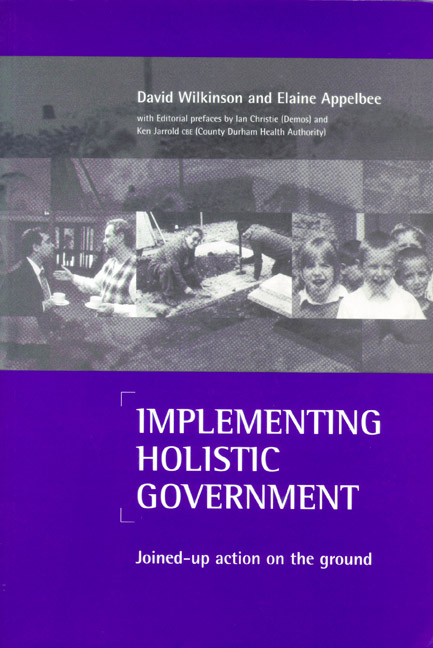Book contents
- Frontmatter
- Contents
- Editorial preface
- Editorial preface
- Acknowledgements
- Summary
- 1 Setting the context
- 2 The functional inheritance and its consequences
- 3 The public service, community interface
- 4 Change that works – sustaining community and quality of life improvement
- 5 Change that works – sustaining organisational and whole system change
- 6 Developing the middle ground: where bottom-up meets top-down (a third way for local governance?)
- 7 Improving sustainable quality of life: the benchmark for Best Value
- 8 Joined-up action on the ground: six key issues that have to be addressed
- 9 Working in the middle ground: recommendations to promote joined-up action on the ground
- References
7 - Improving sustainable quality of life: the benchmark for Best Value
Published online by Cambridge University Press: 05 July 2022
- Frontmatter
- Contents
- Editorial preface
- Editorial preface
- Acknowledgements
- Summary
- 1 Setting the context
- 2 The functional inheritance and its consequences
- 3 The public service, community interface
- 4 Change that works – sustaining community and quality of life improvement
- 5 Change that works – sustaining organisational and whole system change
- 6 Developing the middle ground: where bottom-up meets top-down (a third way for local governance?)
- 7 Improving sustainable quality of life: the benchmark for Best Value
- 8 Joined-up action on the ground: six key issues that have to be addressed
- 9 Working in the middle ground: recommendations to promote joined-up action on the ground
- References
Summary
While the ravages of the 1950s and 1960s have fortunately abated, there is still not sufficient understanding of how a sense of place can be created, maintained or recreated. The debate about urban sustainability highlights the links between the natural, physical, social, cultural, political and economic environments and is thus encouraging holistic thinking. Yet our institutions for decision-making about cities are still largely based on rigid functional specialisations, without sufficient sharing and co-operation between different departments, disciplines and sectors. (Landry and Bianchini, 1995, pp 15-16)
Government consultation has been taking place on radical plans to strengthen local democracy and community leadership through stronger community involvement in community planning. This has resulted in the publication of the White Paper Modern local government: In touch with the people (DETR, 1998). This will result in new duties being placed on local authorities to promote the economic, social and environmental well-being of their areas. Clearly this could be consistent with the discussion in Chapters 4 and 5 about change that works. However, it would need to take seriously the requirement for locally-led capacity building and very different sets of relationships that currently exist between many providers and service beneficiaries. We develop a series of proposals in Chapter 9 that are designed to develop both community and institutional capacities as the basis for changing the relationship between citizens, communities and institutions. This chapter now looks at a series of linked issues that are inextricably linked with people's quality of life in communities.
The previous three chapters – 4, 5 and 6 – focused on social and, to a limited extent, economic well-being. This chapter will look more closely at environmental well-being and its links to the social and economic. The uniting theme is ‘quality of life’ and the means of obtaining this should then become the benchmark of Best Value, the obligation being placed on lateral authorities, and potentially on other public bodies, to improve the quality, efficiency and effectiveness of service delivery for the public.
Local Agenda 21: the path of long-term economic well-being
Sustainability: the vision
Following the Brundtland Report (1987), talk of sustainable development began in earnest even though the term had already been in use for about a decade.
- Type
- Chapter
- Information
- Implementing Holistic GovernmentJoined-Up Action on the Ground, pp. 119 - 136Publisher: Bristol University PressPrint publication year: 1999



